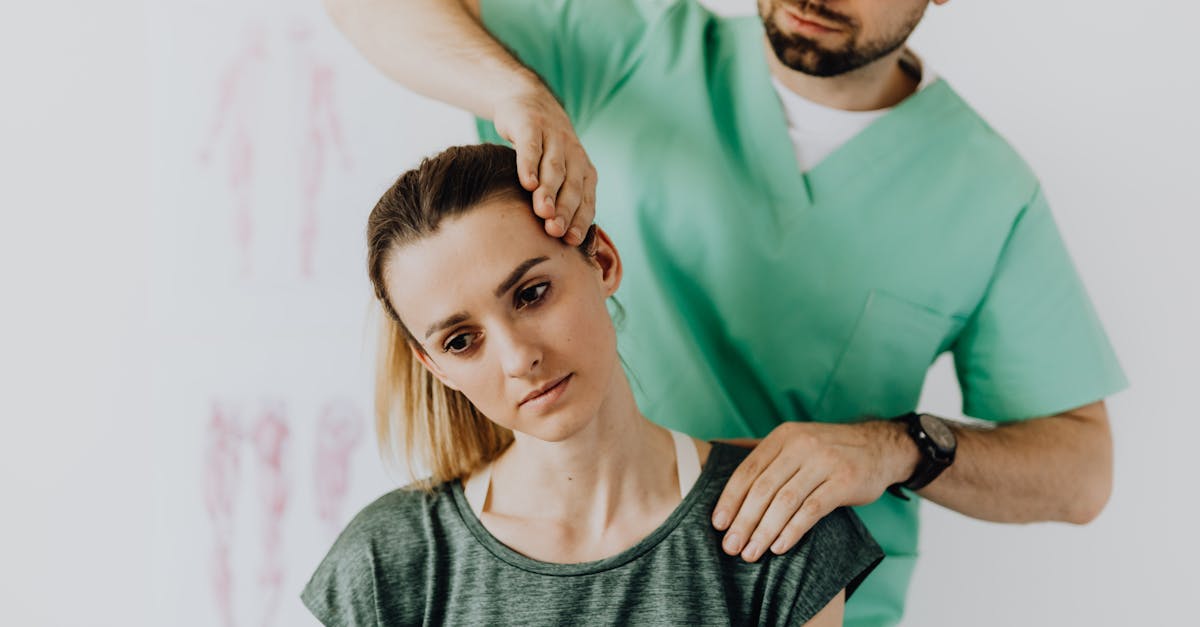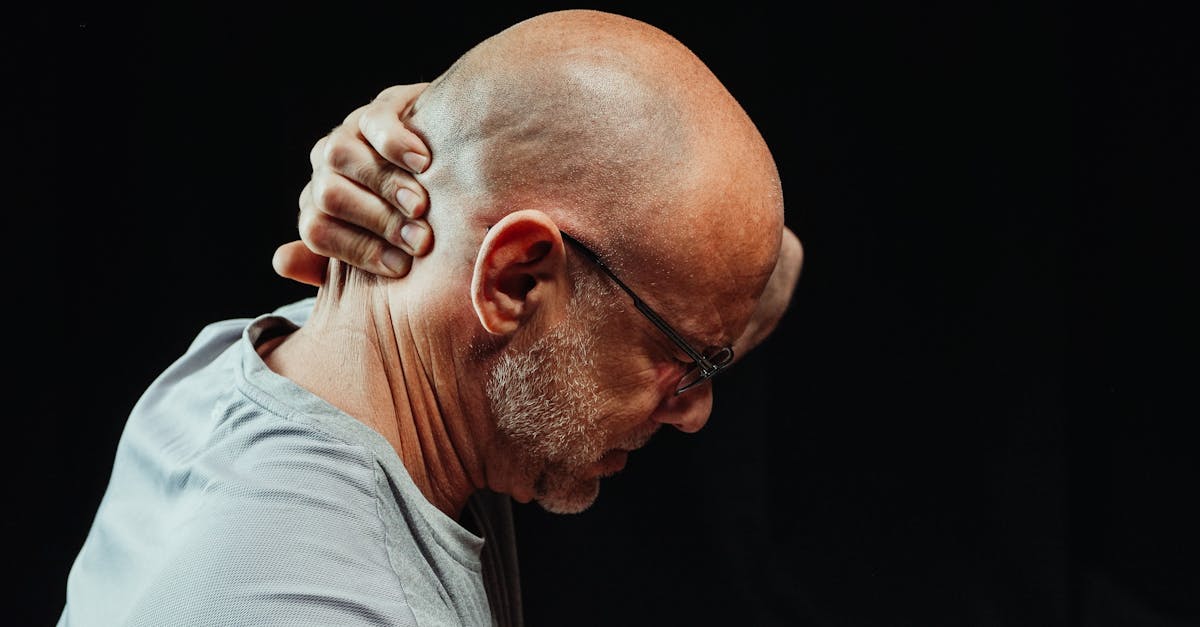|
In Short, quality sleep is crucial for alleviating neck pain and supports the body’s healing process. By maintaining optimal sleep positions and using the right pillow, individuals can reduce musculoskeletal discomfort significantly. This approach not only promotes a more restful night’s sleep but also enhances overall spinal health. Prioritizing restorative rest diminishes muscle tension and prevents further aggravation of existing neck issues, leading to a more comfortable, pain-free daily life. |
Quality sleep plays a crucial role in alleviating neck pain by fostering the body’s healing processes and reducing muscle tension. Optimal sleeping positions, such as lying on one’s back or side, help maintain spinal alignment, thus minimizing stress on the cervical region. Additionally, using the right pillow can provide essential support to keep the neck properly aligned during rest. Prioritizing restorative sleep not only enhances the body’s recovery but also contributes to overall musculoskeletal health, preventing chronic discomfort.

Welcome to Pulse Align, where our innovative method focuses on restoring the body’s natural balance and posture through gentle, imperceptible pulses. Our approach is designed to promote overall well-being while minimizing discomfort and enhancing harmony within the body.
Restoring Natural Balance and Posture
At Pulse Align, we utilize a non-invasive technique that facilitates the body’s natural ability to recalibrate itself. Our gentle pulses aid in reducing muscle and joint tension, ultimately allowing clients to experience improved comfort and enhanced posture. Rather than concentrating on specific discomforts, we focus on fostering a supportive environment where the body can thrive and regain its optimal function.
Personalized Approach for All Clients
Our dedicated team believes in a personalized approach tailored to each client’s unique needs. Many clients have shared positive experiences regarding their overall wellness journey with us, noting significant improvements in postural balance, discomfort reduction, and overall life quality. Our holistic methodology respects the body’s intrinsic processes, ensuring that your wellness journey with us feels empowering and fulfilling.
Discover Pulse Align Near You
We invite you to explore our services and learn more about how Pulse Align can support you and your family in achieving better health through balance and re-alignment. Our clinics are conveniently located in cities such as La Prairie, Mont-Royal, Terrebonne, and more. You can easily find a nearby location to book a consultation that fits your schedule. Visit our website to learn more and book your consultation today. Remember, Pulse Align complements your existing healthcare services while focusing on enhancing your overall well-being in a safe, non-invasive manner suitable for everyone.
Join us at Pulse Align and embark on a journey towards improved muscle tone symmetry and enhanced posture. Your wellness is our priority, and we are here to guide you every step of the way.
- Optimize Sleep Position: Sleep on your back or side.
- Avoid Stomach Sleeping: It puts strain on the neck.
- Choose the Right Pillow: Use a pillow that supports your head and neck.
- Maintain Proper Neck Support: Ensure your neck is aligned with your spine.
- Consider Sleep Quality: Aim for restorative sleep patterns.
- Limit Screen Time Before Bed: Blue light can disrupt sleep.
- Be Mindful of Sleep Duration: Aim for 7-9 hours of sleep nightly.
- Adjust Your Sleep Environment: Create a conducive atmosphere for sleep.

Understanding how quality sleep impacts neck pain is vital for anyone seeking relief from discomfort and striving for improved daily functioning. This article explores the direct correlations between sleep positions, sleep environment, and overall sleep quality with neck pain management. By optimizing these factors, individuals can significantly enhance their neck health and well-being.
The Importance of Sleep Quality
Quality sleep plays a crucial role in maintaining a healthy body, particularly in alleviating musculoskeletal discomfort such as neck pain. Research indicates that not only does the quality of sleep impact the overall health of the spine, but it can also determine how effectively the body repairs itself during rest. Inadequate sleep can lead to increased muscle tension and an exacerbation of existing neck pain, creating a cyclical pattern that can be difficult to break.
Recognizing Sleep Positions
One of the most critical aspects of sleep that affects neck pain is the position in which one sleeps. Studies show that sleeping on one’s side or back helps maintain a neutral spine alignment, which is essential for reducing pressure on the neck. Conversely, sleeping on one’s stomach can cause the neck to bend unnaturally, leading to increased strain on the cervical spine. Therefore, experimenting with various sleep positions that keep the neck aligned with the rest of the spine is an effective strategy for alleviating pain.
Pillow Support and Selection
The choice of pillow is equally pivotal in determining sleep quality and its subsequent effect on neck pain. A pillow that is too thick or too flat can place the neck in an uncomfortable position, contributing to discomfort upon waking. It is advisable to select a pillow that properly supports the head and neck, maintaining the spine’s natural curvature. Cervical pillows and memory foam options are often recommended due to their ability to conform to individual neck shapes and provide adequate support.
Creating a Conducive Sleep Environment
Establishing a restorative sleep environment is also essential in managing neck pain. Factors such as room temperature, noise levels, and light can significantly impact sleep quality. Ensuring that the bedroom is dark, quiet, and maintained at a comfortable temperature can foster a conducive atmosphere for rejuvenating sleep. Additionally, limiting screen time before bed to mitigate blue light exposure can enhance both sleep quality and overall well-being.
Establishing Healthy Sleep Habits
Beyond sleep positions and environment, adopting healthy sleep habits is paramount in improving neck pain. Establishing a consistent sleep schedule that emphasizes regular bedtimes and wake-up times can lead to more restorative sleep cycles. Furthermore, integrating relaxation techniques, such as deep breathing or gentle stretches, before bedtime can expedite the transition into a restful state, reducing the likelihood of tension and discomfort.
Holistic Approaches to Sleep and Health
Managing neck pain effectively involves more than just focusing on sleep. Incorporating lifestyle adjustments that promote overall health—including maintaining hydration, exercising for flexibility, and practicing mindfulness—can further support the body’s recovery processes. Implementing holistic approaches aligns with the principles of Pulse Align, encouraging individuals to prioritize their neuromuscular health.
Recognizing the intricate relationship between quality sleep and neck pain opens up pathways to sustainable wellness. By prioritizing optimal sleep conditions, selecting supportive sleeping arrangements, and cultivating healthy sleep habits, individuals can reclaim their comfort and enjoy greater freedom of movement throughout their daily lives. Embracing these strategies not only alleviates neck pain but also fosters an overall state of well-being and vitality.
| Factor | Impact on Wellness |
| Sleep Position | Encourages natural alignment, promoting comfort and reducing tension. |
| Pillow Support | Supports head and neck, contributing to restful sleep and muscle relaxation. |
| Sleep Quality | Higher quality sleep fosters overall recovery and helps maintain muscle balance. |
| Stress Management | Improves relaxation levels, facilitating a more restorative sleep experience. |
| Consistent Sleep Schedule | Enhances body rhythm, promoting better sleep hygiene and muscular balance. |
| Sleep Environment | A calm, dark, and cool setting promotes deeper, uninterrupted sleep cycles. |
| Mindfulness Techniques | Incorporating mindfulness aids relaxation, contributing to better sleep quality. |
| Physical Activity | Regular exercise improves overall health, facilitating more restful sleep. |
| Napping | Short naps can refresh and rejuvenate, promoting balance and recovery. |
| Hydration | Adequate hydration supports bodily functions and improves sleep quality. |

Transformative Wellness Journeys: Client Experiences of Alleviating Neck Pain through Quality Sleep
Clients from various locations, including La Prairie and Mont-Royal, have discovered the profound impact that quality sleep can have on alleviating neck pain through Pulse Align’s holistic approach. Many have shared their testimonials, emphasizing how the gentle and non-invasive techniques offered have enabled them to reconnect with their bodies and restore balance.
One client from Terrebonne noted, “Since starting my sessions at Pulse Align, I have experienced significant alleviation of my neck pain. The focus on improving my sleep quality and posture through their personalized approach has made a world of difference. I feel my body is recalibrating naturally, leading to greater comfort and well-being.”
Additionally, individuals from Les Escoumins have expressed gratitude for the support provided by the Pulse Align team. They found that not only did their neck discomfort diminish as they embraced better sleep habits, but they also gained a sense of empowerment in managing their health. “I never realized how much sleep quality affected my neck pain until I began this journey. The gentle cues and encouragement from Pulse Align helped me make significant strides towards holistic recovery,” stated a satisfied client.
As word spreads throughout Charlesbourg and Deux-Montagnes, many clients are beginning to appreciate how integrated wellness practices—like those offered by Pulse Align—support their natural ability to heal. “By focusing not just on my symptoms, but also on enhancing my overall lifestyle, I’ve been able to embrace a more balanced way of living,” shared another individual. Their commitment to regular sessions at Pulse Align has fostered a community of health-conscious individuals seeking to reclaim their lives.
In Sainte-Marie and Chicoutimi, clients have praised the inclusive approach of Pulse Align, which welcomes families and individuals of all ages. “The personalized care we received made us feel understood and supported. Our children are also benefiting from the wellness strategies we’ve learned,” remarked a parent, illustrating the positive ripple effect of achieving better sleep and restoring body balance.
From Châteauguay to Saint-Jérôme, the feedback is overwhelmingly positive. Clients are encouraged by the results of their efforts, highlighting how Pulse Align’s dedication to supporting their health journey has transformed their perspectives on well-being. Whether addressing discomfort or enhancing the quality of life, the testimonials reflect a common theme: clients are experiencing successful outcomes through enhanced sleep and holistic recovery.
Explore the transformative services that Pulse Align offers and discover how our unique methodologies can assist you in your wellness journey. To find a clinic near you, visit Our Clinics. We work collaboratively alongside healthcare teams to ensure that clients and their families receive comprehensive support throughout their recovery process.
Understanding the intricate relationship between sleep and neck pain is crucial for individuals seeking relief from chronic discomfort. The relevance of quality sleep in managing neck pain extends beyond simple rest; it plays a significant role in the body’s healing processes, muscle recovery, and overall well-being. Various studies have shown a direct correlation between sleep quality and the severity of neck pain. Insufficient sleep can lead to increased muscle tension, exacerbating pain in the neck and shoulders. Therefore, prioritizing good sleep hygiene is vital for those experiencing neck discomfort.
According to Dr. Sylvain Desforges, an expert in osteopathy, naturopathy, and manual medicine, achieving quality sleep is paramount for healing. As the founding president of TAGMED clinics and the ACMA association, he has dedicated his career to innovating healthcare and specializing in chronic pain management. Dr. Desforges emphasizes that poor sleep quality can significantly impact the musculoskeletal system, specifically contributing to neck pain. By focusing on optimizing sleep habits and environment, individuals can create the foundation for improved health outcomes.
Choosing the right sleep position is essential for reducing neck pain. Dr. Desforges advocates for sleeping on one’s side or back—positions that help maintain a neutral spine alignment—thereby minimizing pressure on the neck. Conversely, sleeping on the stomach can lead to unnatural neck positioning, causing strain. Thus, individuals experiencing neck discomfort are encouraged to experiment with their sleep positions to find what maintains the natural curvature of their spine.
The importance of pillow selection cannot be understated. Dr. Desforges explains how a suitable pillow can provide necessary neck support while sleeping. A pillow that fits snugly between the neck and mattress can help ensure proper alignment and alleviate pressure points. Ideally, memory foam pillows or specialized cervical pillows that conform to the neck’s shape are recommended for those dealing with persistent neck pain.
Beyond positioning, enhancing sleep quality involves establishing healthy sleep habits. Dr. Desforges suggests creating a conducive sleep environment—one that is dark, cool, and quiet—while also maintaining a consistent sleep schedule. Limiting screen exposure before bed can also mitigate the effect of blue light on sleep quality, thus promoting a more restful night’s sleep.
Dr. Desforges recognizes that the body’s natural healing processes occur during sleep. Inadequate rest hampers recovery and can increase inflammation in the neck area, leading to aggravated pain symptoms. Individuals experiencing chronic neck pain should prioritize the recommended 7-9 hours of restorative sleep to allow their bodies the time necessary to heal effectively.
Integrating lifestyle adjustments alongside improved sleep habits can yield significant benefits. According to Dr. Desforges, incorporating stretching and strengthening exercises for neck flexibility can complement good sleep hygiene. Furthermore, addressing stress management techniques through mindfulness or relaxation practices can also improve overall sleep quality while simultaneously mitigating neck tension.
The cumulative effects of these practices feature prominently in Dr. Desforges’s holistic approach to healthcare at TAGMED clinics. Patients seeking relief from neck pain can benefit from evidence-based strategies that encompass sleep quality improvement as a fundamental component of their treatment plan. By focusing on both lifestyle and therapeutic interventions, individuals can actively take charge of their neck pain management.
In conclusion, understanding and improving the quality of sleep is not only beneficial but essential for alleviating neck pain. With insights from experts like Dr. Sylvain Desforges, patients are empowered to embrace practices that foster restorative sleep and overall wellness, ultimately leading to a pain-free life.
Neurovertebral Decompression Technology by TAGMED: A Comprehensive Overview
Mechanism of Action
The neurovertebral decompression technique offered by TAGMED employs a controlled and progressive traction force applied to the spine to alleviate pain and discomfort. This method works by increasing the space between vertebrae, leading to a significant reduction in pressure on intervertebral discs and nerve roots. This reduction in pressure is crucial as it promotes better fluid circulation in the affected area, which is essential for recovery. As the decompression occurs, it facilitates decreased inflammation and enhances comfort by allowing the spine to undergo natural healing processes.
Specific Benefits
This non-invasive approach provides effective relief for chronic pain and symptoms associated with conditions such as herniated discs, bulging discs, or moderate to severe spinal stenosis. One of the primary benefits of this technology is its ability to reduce pressure on nerve structures, effectively easing discomfort and improving overall function. With optimized fluid circulation around the discs, patients often experience an expedited recovery process and an overall improvement in quality of life. This approach aligns well with holistic health principles, enhancing the body’s natural ability to heal and promoting a return to daily activities with greater ease.
Comparison with Other Treatments
When comparing TAGMED’s neurovertebral decompression technology with other therapeutic methods, such as analgesics, corticosteroid injections, traditional surgery, or physical therapy, several unique advantages emerge. Unlike invasive treatments that can carry significant risks, TAGMED’s approach minimizes any associated complications. Patients commonly report a quicker recovery time with neurovertebral decompression compared to conventional treatments. This non-invasive option attracts many patients due to its lower risk profile and the potential for faster, more effective relief of symptoms.
Case Studies and Testimonials
Numerous patients have shared positive experiences after undergoing TAGMED’s neurovertebral decompression therapy. For example, individuals suffering from chronic neck pain associated with bulging discs have noted substantial, lasting reductions in pain levels. Many have expressed appreciation for the swift return to their daily routines and a noticeable decrease in reliance on pharmacological treatments. These firsthand experiences highlight the tangible benefits of this technology and illustrate its potential to significantly impact chronic pain management positively.
In conclusion, the integration of TAGMED’s neurovertebral decompression technology represents a promising avenue for patients grappling with chronic pain and related conditions, making it an essential consideration in the realm of pain management practices.
Conclusion: The Direct Impact of Quality Sleep on Neck Pain Relief
Quality sleep emerges as a foundational element in managing and alleviating neck pain. As research continues to reveal, not merely the quantity but also the quality of sleep plays a pivotal role in the body’s healing process. Inadequate sleep or poor sleep hygiene can lead to increased tension and heightened susceptibility to pain, creating a vicious cycle that exacerbates discomfort in the neck area. Understanding how to optimize sleep is essential for anyone dealing with chronic neck issues.
Employing proper sleep positions is one effective strategy to reduce neck strain. It is widely accepted that sleeping on one’s back or side tends to maintain healthier spinal alignment compared to stomach sleeping. This alignment decreases stress on the cervical spine, minimizing the potential for discomfort upon awakening. Investing in the right pillow that offers adequate support for the neck can also contribute positively to achieving a restful night’s sleep.
Furthermore, creating an optimal sleep environment—one that is dark, cool, and quiet—facilitates restorative sleep, thereby enhancing the body’s ability to heal. The importance of sleep duration cannot be overstated; aiming for 7-9 hours of quality sleep nightly is recommended to support recovery processes. Additionally, limiting screen time and engaging in relaxing pre-sleep routines can further improve sleep quality, ultimately influencing neck health.
Incorporating mindfulness and gentle stretching into daily practice not only aids in achieving better sleep but also alleviates overall muscular tension. As individuals learn to prioritize sleep and implement these strategies, they will likely witness a significant reduction in neck pain, enhanced comfort, and improved overall health. The synergy between quality sleep and neck pain relief forms a vital component of a holistic approach to wellness.

Do you suffer from a chronic condition that responds little or not at all to conservative treatments?
At Pulse Align, we understand that discomfort and tension can often hinder your daily life and overall well-being. Our innovative, non-invasive method leverages gentle, imperceptible pulses that support the body’s natural ability to restore balance and improve posture. This approach not only aids in reducing muscle and joint tension but also promotes a harmonious state, contributing to a more fulfilling lifestyle. By opting for a holistic perspective, clients can explore how nurturing their bodies through quality sleep may lead to remarkable improvements in comfort and overall wellness.
Rather than directly focusing on discomfort or specific conditions, Pulse Align provides an atmosphere where the body can recalibrate itself naturally. Our unique methodology respects the body’s intrinsic processes, allowing individuals to experience significant transformations in posture and comfort. Many clients find themselves empowered as they notice better alignment and improved movement, shedding the constraints of tension that may have previously limited them.
Every experience at Pulse Align is tailored to meet individual needs. Our clients have shared inspiring testimonials that highlight their journeys toward improved comfort, enhanced posture, and overall wellness. Many have reported feeling clearer and lighter, even noticing reductions in tension that once felt overwhelming. These personal accounts underscore how our gentle approach resonates with the body’s innate desire for balance and harmony. Families, including children and expectant parents, can benefit from our services, making it a versatile option for all.
We invite you to explore what Pulse Align can uniquely offer. With convenient locations in La Prairie, Mont-Royal, Terrebonne, and beyond, our clinics are accessible to anyone looking to embark on a journey toward better wellness. To learn more about our approach and to book a consultation for yourself or your loved ones, visit our website at Pulse Align. Remember, our services complement but do not replace the care provided by your healthcare team, allowing you to embrace a holistic route to feel your best.
Frequently Asked Questions
Neck Pain
Can I use a neck collar?
A cervical collar can provide temporary support, but prolonged use may weaken neck muscles.
Does a cervical herniated disc always cause pain?
Not always, but it can cause pain, numbness, tingling, and weakness in the arms when it compresses a nerve root.
Can I do stretching exercises at work?
Yes, taking breaks, gently rotating your neck and shoulders can reduce accumulated tension.
What is cervical pain?
It’s pain localized in the neck area, which can radiate to the head, shoulders, or upper back.
Are cervical manipulations dangerous?
If performed by a qualified professional, they are generally safe, though there is a slight risk of complications.
Is cervical osteoarthritis common?
Yes, it’s common with age. Cartilage in the cervical joints wears down, causing pain and stiffness.
Are anti-inflammatory medications helpful?
They can temporarily relieve pain, but addressing the underlying cause is essential for lasting relief.
What are common causes of neck pain?
Frequent causes include poor posture, stress, muscle tension, cervical osteoarthritis, herniated discs, or trauma.
Does working on a computer cause neck pain?
Often, yes. A forward head position in front of a screen can strain the cervical region.
Does car driving posture matter?
Yes, a poorly adjusted seat, a steering wheel too far, or a bad driving position can strain your neck.
Sophie Gambert understands that neck pain is far more than a physical ache—it’s a roadblock to living the life you love. As a Neck Pain Awareness Advocate at Pulse Align, she is committed to shedding light on the underlying causes, sharing practical relief strategies, and offering genuine support to readers seeking to reclaim their freedom of movement. With a warm, empathetic voice and a keen eye for the latest in pain management research, Sophie leads conversations that uplift, educate, and inspire. She believes that every individual deserves to feel heard, understood, and guided toward healing, one step at a time.
Medical Disclaimer
The information and advice provided on this site do not replace the advice, diagnosis, or treatment of a healthcare professional. Please note that the author of this article is neither a doctor nor a specialist in a medical specialty as defined by the Collège des médecins du Québec. Manual medicine, functional medicine, and sports medicine as described on this site exclude any medical treatment or diagnosis made by a doctor or medical specialist. Always consult your doctor for any medical questions. For more details, please read our complete Legal Notice.



